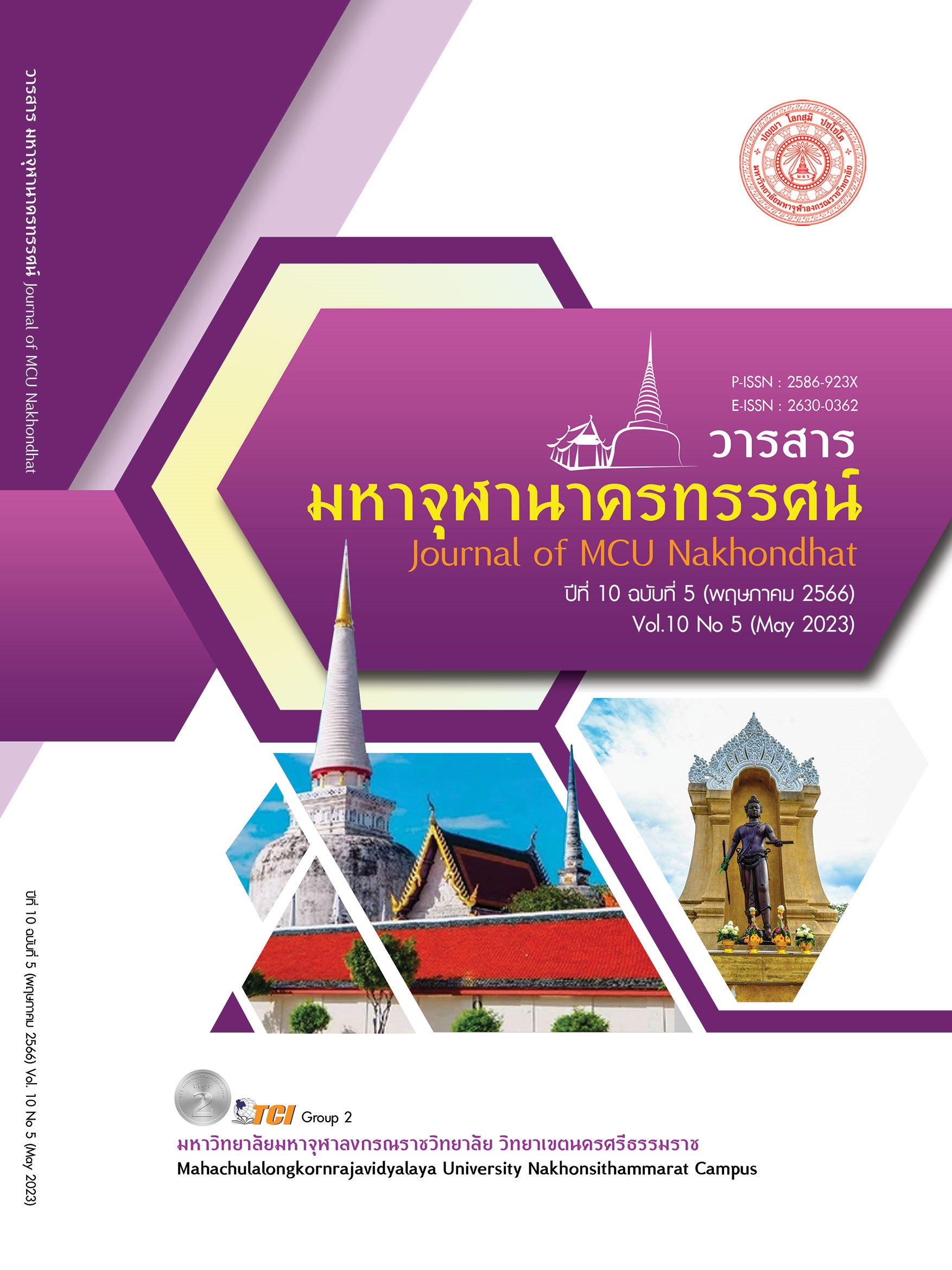EFFECTS OF THE INQUIRY MATHEMATICS LEARNING (5E) THROUGH REAL LIFE SITUATIONS ON MATHEMATICAL REASONING BASED ON THE PISA ASSESSMENT FRAMEWORK
Main Article Content
Abstract
The purposes of this study are as follows: 1) to compare students’ mathematical reasoning based on the PISA assessment framework before and after administrating the inquiry mathematics learning (5E) through real life situations; 2) to compare students’ mathematical reasoning based on the PISA assessment framework of students after administrating the inquiry mathematics learning (5E) through real life situations with the criterion of 70%. The sample of this study included 38 Matthayomsuksa Four students in the second semester of the 2022 academic year at Srinakharinwirot University Prasarnmit Demonstration School (Secondary). They were selected using the cluster random sampling technique. The duration of the research was 16 periods. The instruments used in this study were lesson plans and mathematical reasoning based on the PISA assessment framework test, an item of objective congruence of 0.67-1.00, difficulty of 0.25 – 0.75, an item discrimination of 0.20 – 0.90 and a reliability of 0.79. This research used the One Group Pretest-Posttest Design. The statistical procedures used for data analysis were a t-test for dependent samples and a t-test for one sample. The results revealed the following: 1) the mathematical reasoning based on the PISA assessment framework of the students after experiencing the inquiry mathematics learning (5E) through real life situations were higher than before and at a statistically significant level of .05; and 2) the mathematical reasoning based on the PISA assessment framework of the students after experiencing the inquiry mathematics learning (5E) through real life situations was higher than the criterion of 70%, with a statistically significant level of .05 and an average of 23.45, amounting to 73.28%.
Article Details

This work is licensed under a Creative Commons Attribution-NonCommercial-NoDerivatives 4.0 International License.
References
กระทรวงการศึกษาธิการ. (2560). มาตรฐานการเรียนรู้และตัวชี้วัด กลุ่มสาระการเรียนรู้คณิตศาสตร์ (ฉบับปรับปรุง พ.ศ. 2560). กรุงเทพมหานคร: โรงพิมพ์ชุมนุมสหกรณ์การเกษตรแห่งประเทศไทย.
ชมนาด เชื้อสุวรรณทวี. (2561). การเรียนการสอนคณิตศาสตร์ . กรุงเทพมหานคร: โรงพิมพ์แห่งจุฬาลงกรณ์มหาวิทยาลัย.
พีชาณิกา เพชรสังข์ และอัมพร ม้าคนอง. (2556). ผลของการจัดกิจกรรมการเรียนรู้คณิตศาสตร์โดยใช้รูปแบบการสอน 5E ร่วมกับคำถามปลายเปิดที่มีต่อความสามารถในการให้เหตุผลทางคณิตศาสตร์และความสามารถในการคิดอย่างมีวิจารณญาณของนักเรียนชั้นมัธยมศึกษาปีที่ 2. วารสารอิเล็กทรอนิกส์ทางการศึกษา, 9(3), 16-30.
สถาบันส่งเสริมการสอนวิทยาศาสตร์และเทคโนโลยี. (2555). ทักษะและกระบวนการทางคณิตศาสตร์ (พิมพ์ครั้งที่ 3). กรุงเทพมหานคร : 3-คิว มีเดีย.
สถาบันส่งเสริมการสอนวิทยาศาสตร์และเทคโนโลยี. (2558). ผลการประเมิน PISA 2018 : บทสรุปสำหรับผู้บริหาร. เรียกใช้เมื่อ 10 ตุลาคม 2565 จาก https://drive.google.com/file/d/11xU3cWrvQ91JnBqDflrZ-EEHJayMxshA/view
สถาบันส่งเสริมการสอนวิทยาศาสตร์และเทคโนโลยี. (2563). PISA 2021 กับการประเมินความฉลาดรู้ด้านคณิตศาสตร์. เรียกใช้เมื่อ 10 ตุลาคม 2565 จาก https://pisathailand.ipst.ac.th/issue-2020-53/
สิทธิกร เรืองศรี. (2560). การจัดการเรียนรู้แบบสืบสอบที่เน้นสถานการณ์ปัญหาคณิตศาสตร์ในชีวิตจริงเรื่อง อนุพันธ์และการประยุกต์ของอนุพันธ์ เพื่อส่งเสริมความสามารถในการให้เหตุผลและการเห็นคุณค่าในวิชาคณิตศาสตร์ของนักเรียนชั้นมัธยมศึกษาปีที่ 6. วารสารวิทยาศาสตร์ มศว, 33(1), 231-247.
สุวิทย์ มูลคำและอรทัย มูลคำ. (2553). 21 วิธีจัดการเรียนรู้ : เพื่อพัฒนากระบวนการคิด (พิมพ์ครั้งที่ 9). กรุงเทพมหานคร: ดวงกมล.
อัมพร ม้าคนอง. (2559). ทักษะและกระบวนการทางคณิตศาสตร์ : การพัฒนาเพื่อพัฒนาการ (พิมพ์ครั้งที่ 3). กรุงเทพมหานคร: ศูนย์ตำราและเอกสารทางวิชาการ คณะครุศาสตร์ จุฬาลงกรณ์มหาวิทยาลัย.
National Council of Teachers of, M. (2000). Principles and standards for school mathematics. Reston, VA : National Council of Teachers of Mathematics.
OECD. (2018). PISA-2021-mathematics-framework. Retrieved October 10, 2022, from https://www.oecd.org/pisa/sitedocument/PISA-2021-mathematics-framework.pdf
Piaget Jean. (1969). The psychology of the child. New York: Basic Books.


